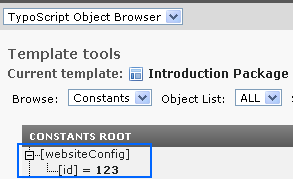Attention
TYPO3 v8 has reached its end-of-life March 31st, 2020 and is not maintained by the community anymore. Looking for a stable version? Use the version switch on the top left.
There is no further ELTS support. It is recommended that you upgrade your project and use a supported version of TYPO3.
->TSFE¶
Property
jumpUrl_transferSession
Data type
boolean
Description
If set, the jumpUrl redirection to the URL will be prepended with a parameter that transfers the current fe_users session to that URL. This URL should be the TYPO3 frontend in the same database, just at another domain (else it makes no sense).
You can implement it in your own links if you like. This is how you do:
You must send the parameter 'FE_SESSION_KEY' as GET or POST. The parameter looks like this: [fe_user-session-id]-[a hash made to prevent misuse]
The parameter can be calculated like this:
$param = '&FE_SESSION_KEY=' . rawurlencode(
$GLOBALS['TSFE']->fe_user->id . '-' .
md5( $GLOBALS['TSFE']->fe_user->id. '/' . $GLOBALS['TYPO3_CONF_VARS']['SYS']['encryptionKey'])
);
Property
constants
Data type
[TypoScript Frontend Constants defaults]
Description
Defaults for TypoScript Template constants!
This feature allows you to pass some amount of information (in the form of TypoScript Template constants) to the frontend.
The specific use of this should be information which you want to configure for both frontend and backend. For instance you could have a backend module which should act in a certain way depending on in which branch of the page tree it operates. The change of behavior is set by Page TSconfig as always, but since you need the same setting applied somewhere in the frontend you don't want the redundancy of specifying the value twice. In such a case you can use this feature.
Example:
TSFE.constants.websiteConfig.id = 123
In the TypoScript templates you can now insert this constant as {$websiteConfig.id}

In the backend module (in the Web main module) you can reach the value by a few lines of code like these
$PageTSconfig = \TYPO3\CMS\Backend\Utility\BackendUtility::getPagesTSconfig($this->pObj->id);
$websiteID = $PageTSconfig['TSFE.']['constants.']['websiteConfig.']['id'];
Note
In the frontend the setting of default constants will only apply to a branch of the tree if a template record is found on that page (or if a template record is set for "next level"). In other words: If you want the Page TSconfig constant defaults to affect only a certain branch of the page tree, make sure to create a template record (a blank one will do) on the page that carries the Page TSconfig information.
[page:TSFE]
